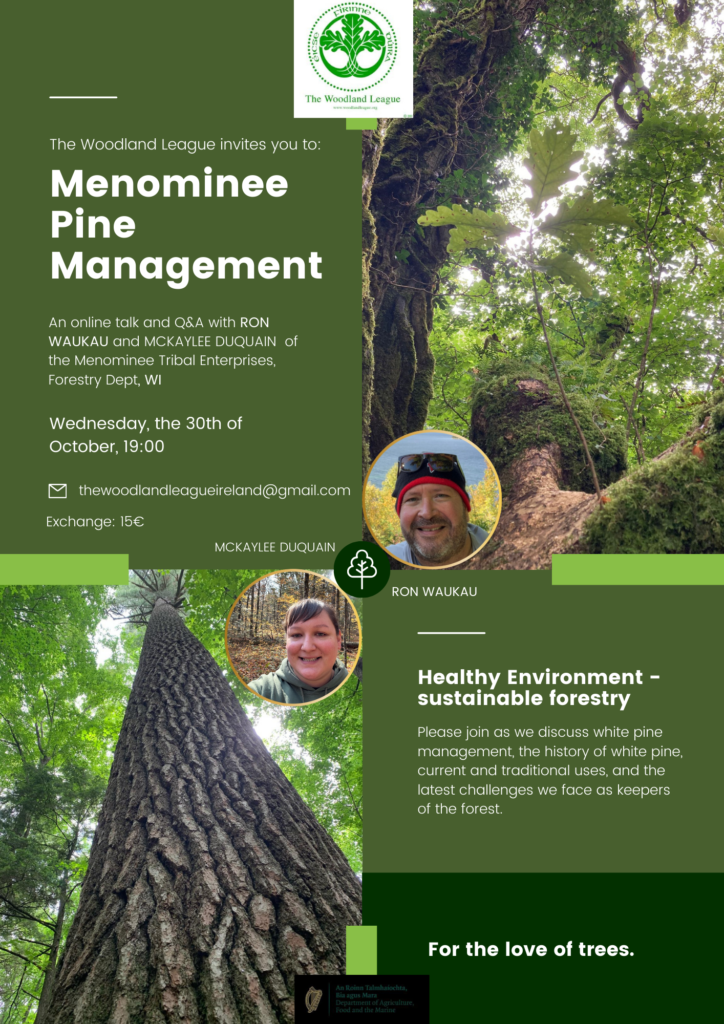Wednesday, the 30th of October 2024, 19:00

White Pine Management
The Menominee people (located in Wisconsin, US) are known for their forest and sustainable practices. One of the species that has a substantial presence on the forest is Eastern White Pine (Pinus strobus). While the rest of the state of Wisconsin was cut over in the late 1800’s and early 1900’s, only dying and dead trees were harvested on the Menominee Forest. In 1973 the Menominee gained the ability to manage their forest without the direct oversight of the government.
Now things are harvested a little differently, with sustainability and natural regeneration a priority. The white pine that was once young seedlings, saplings, and poles during the cut over times, are now mature and towering adults. Much of this pine is at an age where management decisions will have to be made in order to guarantee regeneration or transition to a different forest type. All the while maintaining a resource for the tribal members to use.
Please join as we discuss white pine management, the history of white pine, current and traditional uses, and the latest challenges we face as keepers of the forest.
We plan to cover the history of pine in Wisconsin and on the reservation. We hope to discuss fire use back then and now, the nature of pine since it needs a lot of sunlight, our different treatments of pine, which depend on soil and age, including shelterwoods/seedtrees, even age thin, pine release, clearcut natural regeneration with pine release, pine barrens/savanna, single tree selection with super canopy. These different treatment provide many forest products at different stages, which is available to tribal members.
At the end of the talk, we will have a Q&A to discuss any questions that might arise during the talk.
Ron Waukau: I am an enrolled member of the Menominee Nation, and have lived my whole live on the reservation. I began my long career at Menominee Tribal Enterprises in 1988. Over the decades, positions I have served include Timber Marker, Lead Timber Marker, Fuels Specialist, Interim Fire management Officer, Inventory Forest Technician, and currently Forest Manager. Working in a variety of positions within different departments allowed me to gain experience across the whole of Forestry and rapport with staff.
I did not pursue secondary education, however I have learned so much with my opportunity to work on the forest, and learned things that could never be taught in the classroom. I now use these lessons to manage the forest as well as maintain a good relationship with my staff who are integral to the forest process.
Outside of work, I find myself returning to the forest where I enjoy hunting, fishing, and gathering.
McKaylee Duquain: I am an enrolled member of the Menominee Nation, and I was raised on the reservation until I left to further my education. Upon completing my undergraduate degree, I returned home to work on my forest. I began working with Menominee Tribal Enterprises on a Continuous Forest Inventory Project, which transitioned into a permanent Inventory Forester position. With a desire to continue my education and experience, I left home once again to pursue graduate school. After being away from home for two years paired with a pandemic, I jumped at the first opportunity to return home to work on my forest again. This brings me to my current position, which I was formerly supervised by, head of Inventory within the Forestry Department at Menominee Tribal Enterprises.
Aside from my work at forestry, I still spend a lot of time outdoors, including a lot of camping and hiking. When the season is right, I enjoy foraging for various plants and mushrooms. I also am a basket weaver and harvest black ash trees to process the materials for baskets, though that tradition is being threatened by the emerald ash borer. I love to travel when I get the opportunity, but at the end of the day it feels so good to be home.
The exchange for this online talk is 15€.
Booking your spot is essential.
You can book your spot here: https://buytickets.at/thewoodlandleague/1445600
People who have booked in will receive an email with the login details on the day of the talk.
Should you book in and not be able to join the live event, we will send you the recording of the talk, that will be available for another week.
We will use the funds for all the running Woodland League projects.
You can find out more here: https://www.woodlandleague.org/
We are looking forward to this online talk and all the knowledge it brings.
See you there.
